Ruthless managers could be a god send if you are negotiating with someone that is inflexible. What happens if you are dealing with them directly and maybe your own best interests are not their agenda, rather the exploitation of your financials. If is sounds strange, chances are it could be true and once that curtain is pulled back, be sure to take care of your own agenda rather than place it in the hands of unscrupulous lawyers or managers.
During 2012 we saw quite a few events that still leave us slack jawed. Some lawyers and managers, that we have dealt with, have left us with the perfect stereotype of their job position. If you have to deal with issues that are regarding your financials or contracts, do yourself a big favor and read up on the information and don't let others take your money just to help "guide" you to the right decisions. Be responsible for your own future and take control of your situation.
Link to original post on Neatorama
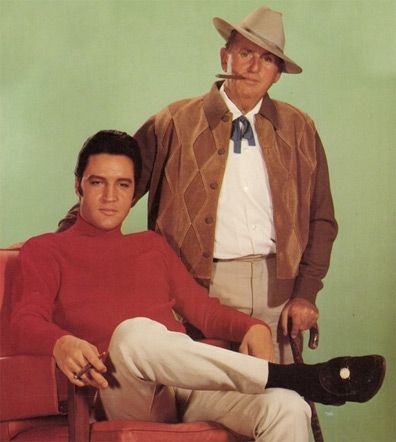 They've got bad hair and big cigars, and they want their 10 percent. Meet the world's most notorious music managers.
They've got bad hair and big cigars, and they want their 10 percent. Meet the world's most notorious music managers.
Born Andreas Cornelis van Kuijk in the Netherlands, Parker immigrated to the United States in the early 1930s and worked as a traveling carny. In the circus, he learned the two secrets of getting people into the tent: Always have a gimmick, and always appeal to the lowest common denominator. (Think of Presley's salacious hip thrusts and his legacy of cinematic fluff.)
Parker first managed country music stars such as Hank Snow and Eddy Arnold, but then found his big-top sensation—Elvis. Not willing to settle for the standard 10 percent fee, Parker cut himself in for 25 percent (and eventually 50 percent). Along the way, he invented the hallmarks of celebrity management—money up front, total media control, and massive merchandising. He was so cutthroat that when Elvis overdosed in 1977, the Colonel practically went straight from the funeral in Memphis to New York to negotiate deals for Elvis memorabilia.
During Elvis' final years as a Vegas perennial, Parker became addicted to gambling. When the Colonel died in 1997, he had less than $1 million of the estimated $100 million he made during his lifetime. He'd gambled the rest away.
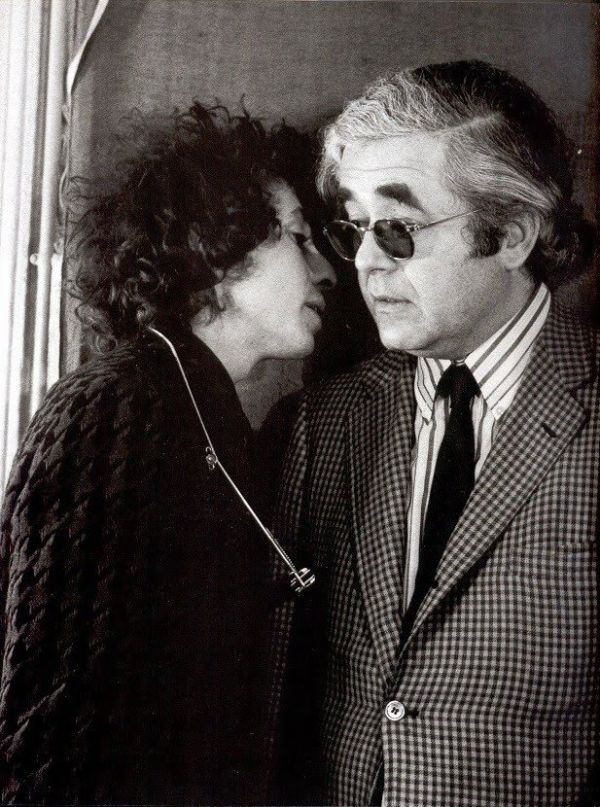 Albert Grossman was known as The Bear. And depending on when you met him, he could be a Teddy or a grizzly. In the late 1950s, he was more of a Teddy. A music lover with a booming voice and a master's degree in economics, Grossman opened a club in Chicago, where he nurtured the careers of folk singers such as Odetta, Gordon Lightfoot, and Bob Dylan.
Albert Grossman was known as The Bear. And depending on when you met him, he could be a Teddy or a grizzly. In the late 1950s, he was more of a Teddy. A music lover with a booming voice and a master's degree in economics, Grossman opened a club in Chicago, where he nurtured the careers of folk singers such as Odetta, Gordon Lightfoot, and Bob Dylan.
But when Grossman moved into personal management in the 1960s, the grizzly emerged. He used his bulky 6-foot frame and unnerving stare to intimidate record labels into parting with vast fortunes. Elektra Records honcho Bob Krasnow told Musician magazine, "What you see today in the music business is the result of Albert. He changed the whole idea of what a negotiation was all about."
With a taste for fine living, the grizzly got greedy. Bob Dylan disapproved, and their relationship grew bitter. With Grossman in mind, Dylan wrote the lyrics, "I pity the poor immigrant who falls in love with wealth and turns his back on me." He terminated Grossman's services a few months later in 1971.
But that was hardly the end of their relationship. The Bear trailed Dylan for more a decade, filing a multimillion dollar lawsuit for back royalties. At the time of his death in 1987, Grossman was still pursuing the money. In Martin Scorsese's No Direction Home, Dylan said, "He was kind of like a Colonel Parker figure. You could smell him coming."
Unlike the Colonel, who was a family man, Defries lived extravagantly. With his eight Manhattan apartments, karate-suit-wearing bodyguards, and crushed-velvet suits, Defries was more of a rock star than Bowie. In fact, at the height of his Ziggy fame, Bowie often borrowed money from Defries just to buy groceries. "I slaved and made nothing," Bowie said after dumping Defries in 1975. The divorce wasn't easy. In addition to 50 percent of all back royalties, Bowie surrendered 16 percent of future gross earnings through 1982.
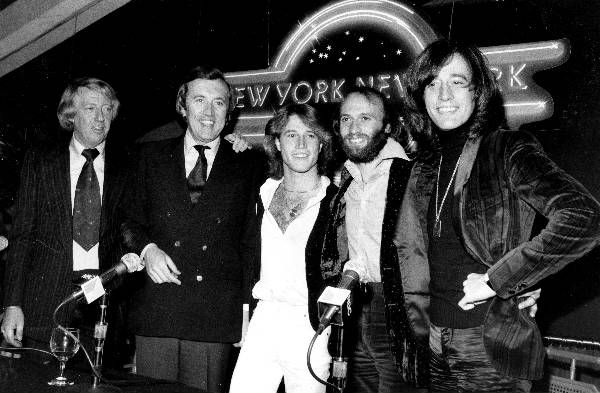
As a junior partner in Brian Epstein's music empire, Robert Stigwood was almost given the opportunity to manage The Beatles. Unfortunately for him, the group rebelled. As Paul McCartney told him, "If you somehow manage to pull this off, we can promise you one thing. We will record "˜God Save the Queen' for every single record we make from now on, and we'll sing it out of tune."
But perhaps The Beatles weren't aware of just how hard he worked. For Stigwood, management meant working for your artists 24 hours a day, seven days a week. He traveled with his two most famous bands—a power-rock trio called Cream and a pop-disco trio called the Bee Gees—playing the role of father, confessor, and babysitter all at once. He'd hang out in the studio while they recorded and help them pick out five-button suits after work. In fact, Stigwood may have been a little too hands-on. In 1980, after 13 years under his care, the Bee Gees sued, claiming that Stigwood had withheld $75 million in royalties. Stigwood countersued, and they settled out of court, trading barbs in the press.
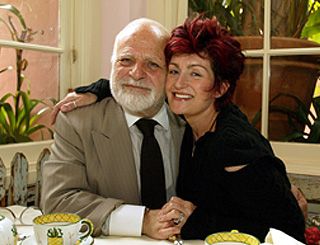 Don Arden once had his henchmen dangle fellow manager Robert Stigwood out a fourth-floor window. Why? Arden suspected Stigwood of trying to steal one of his bands. Known as the "Al Capone of Pop," Arden swaggered through 1960s London, skimming cream off the top of every royalty check he could get his hands on. Even when one of his most successful bands, The Small Faces, was bringing in loads of cash, he only offered them an allowance of £20 a week.
Don Arden once had his henchmen dangle fellow manager Robert Stigwood out a fourth-floor window. Why? Arden suspected Stigwood of trying to steal one of his bands. Known as the "Al Capone of Pop," Arden swaggered through 1960s London, skimming cream off the top of every royalty check he could get his hands on. Even when one of his most successful bands, The Small Faces, was bringing in loads of cash, he only offered them an allowance of £20 a week.
In the early 1970s, Arden launched Jet Records for the English heavy metal band Black Sabbath. Then, in 1979, lead singer Ozzy Osbourne was fired from the group. Arden didn't seem too bothered. That is, until he discovered that his daughter, Sharon, who'd been working for him, had picked up Ozzy as a client. Angry that she'd stolen business from him, Arden reportedly sicced his vicious Dobermans on her. Sharon was pregnant at the time and lost the child. However, she held on to Ozzy's business and later married the rock star.
In 1987, Don Arden faced trial for blackmailing business associates, but was acquitted. As for Sharon, she and her father reconciled after he was diagnosed with Alzheimer's in 2001. He passed away in 2007.
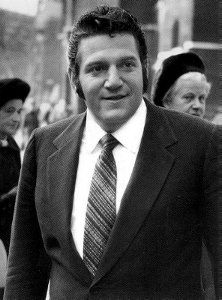 The Beatles' manager Brian Epstein might have built a financial empire, but it collapsed two years after he died in 1967. And that's when money-vulture Allen Klein swooped in to pick it clean.
The Beatles' manager Brian Epstein might have built a financial empire, but it collapsed two years after he died in 1967. And that's when money-vulture Allen Klein swooped in to pick it clean.
The brash, barrel-shaped former accountant cut his teeth in the music business in the early 1960s. Once dubbed the "Robin Hood of Pop," Klein made an early name for himself by reaping millions in misappropriated royalties for clients such as crooner Bobby Darin and soul legend Sam Cooke. By the time he met The Beatles, he was negotiating megadeals for The Rolling Stones. John Lennon admired his street smarts, and George and Ringo followed suit. But Paul never fell prey to his charms. In fact, he often had nightmares about Klein in which the manager surfaced as an evil dentist.
Indeed, Klein didn't hesitate to pull teeth. The moment he took control of The Beatles, he gutted the band's production company, firing whomever he deemed superfluous. He then negotiated lucrative publishing and recording deals for the band and nabbed excessive commissions. In 1973, lawsuits from John, Paul, George, and Ringo began piling in.
Throughout the years, Klein soured several relationships. He was dropped by The Rolling Stones for unethical behavior in the 1960s and investigated by the IRS in the 1970s for embezzling money from George Harrison's benefit show The Concert for Bangladesh. In 1997, Klein was still up to his old tricks, suing British indie rock group The Verve over their hit "Bittersweet Symphony." The band had sampled orchestration from "The Last Time," a recording by The Rolling Stones that Klein controlled. After winning the lawsuit, Klein licensed The Verve's masterpiece to Nike for millions. Klein lives in Los Angeles, where he has one remaining client—wall-of-sound producer Phil Spector. [ed. note: Klein died in 2009]
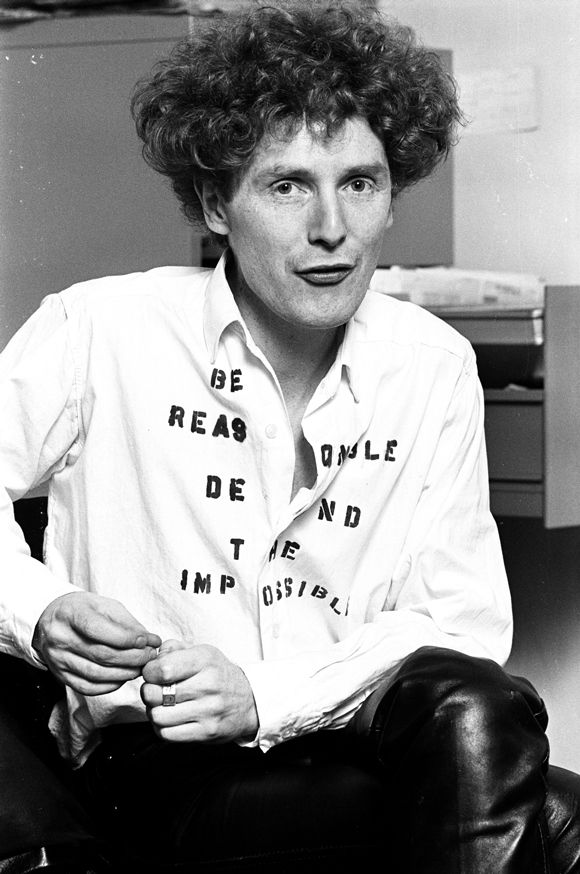 "The music wasn't important," Malcolm McLaren once said. "It was a declaration of intent and an attitude." In 1975, when McLaren took on a pub band named The Swankers (soon renamed the Sex Pistols), the intent was chaos, and the attitude was infamously punk. Eschewing the pomp of 1970s rock, The Sex Pistols played fast, hard music that condemned authority—the perfect style for manager McLaren, who lived to be a lightning rod.
"The music wasn't important," Malcolm McLaren once said. "It was a declaration of intent and an attitude." In 1975, when McLaren took on a pub band named The Swankers (soon renamed the Sex Pistols), the intent was chaos, and the attitude was infamously punk. Eschewing the pomp of 1970s rock, The Sex Pistols played fast, hard music that condemned authority—the perfect style for manager McLaren, who lived to be a lightning rod.
In May 1977, the Sex Pistols released the incendiary song "God Save The Queen." Swiping its name from the British national anthem, the spitfire single equated the royal family with a "fascist regime" and derided the Queen as "no human being." With Britain in tumult, McLaren booked the Pistols on a boat trip down the Thames, where they performed outside the Houses of Parliament. The police raided the party, only adding to the glory of the chaos. The happening was McLaren's masterpiece.
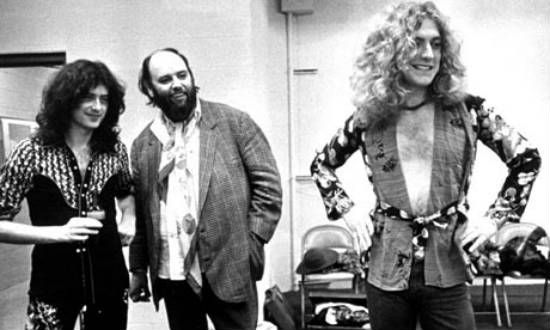
A bearded behemoth, Peter Grant was 300 lbs. of pure intimidation. He once beat up a music promoter who tried to stiff one of his singers after a show. Six policemen attempted to restrain him, but he pummeled them to the ground, too.
Born in London in 1935, Grant had a Dickensian childhood, replete with the trials of war, poverty, and heartbreak. But it all made him stronger. By the time he was a teenager, he was so big that he wrestled professionally (performing under the name Prince Mario Alassio). Grant soon parlayed this strength into management muscle, strong-arming for rock "˜n' roll legends Chuck Berry and Little Richard. But he didn't discover his destiny until he became the manager and unofficial fifth member of Led Zeppelin.
Although he was feared and loathed in many circles, Grant had one truly admirable trait—he believed the artist mattered most. In 1968, he finessed Atlantic Records into coughing up an unprecedented $200,000 advance for Zeppelin's five-year recording contract, plus the highest royalty rate ever negotiated for a band (five times that of The Beatles). He rode the Zeppelin high through the 1970s. But when the band's drummer, John Bonham, died in 1980, Grant was traumatized. He retreated behind the moat surrounding his mansion and binged on cocaine and junk food for the rest of the decade.
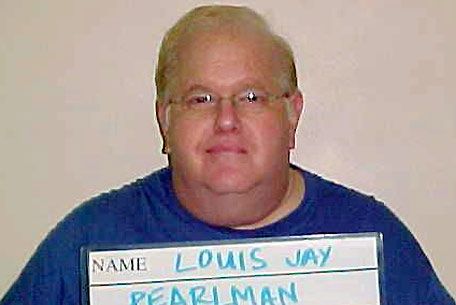 When Lou Pearlman was arrested in 2007 for embezzling more than $300 million from investors, decades of scamming and swindling came to an end. And apparently, he did it all with a televangelist's flair. Pearlman's former publicist, Jay Marose, once said of him, "You could "¦ hold a Bible in one hand and tell him your name, and he could tell you you were wrong and make you believe it."
When Lou Pearlman was arrested in 2007 for embezzling more than $300 million from investors, decades of scamming and swindling came to an end. And apparently, he did it all with a televangelist's flair. Pearlman's former publicist, Jay Marose, once said of him, "You could "¦ hold a Bible in one hand and tell him your name, and he could tell you you were wrong and make you believe it."
For years, the rotund New Yorker lined his pockets with the proceeds of dodgy business ventures. He was the advertising genius behind the Jordache Jeans' blimp and its inaugural flight, which lasted one minute before crashing into a garbage dump. He also built a fake aviation company by showing photos of model planes to investors. But he found his calling when he started managing a group of Chippendales dancers in the 1980s. After working with the topless beefcakes for several years, he happened to meet the New Kids on the Block in 1992, and the combination led Pearlman to an epiphany.
Using newspaper ads and casting calls for teenage boys who could sing and dance, Pearlman formed the Backstreet Boys and *NSync. Within three years, the prefab quintets ruled popular music. "Big Poppa" Pearlman reveled in the glory, paying for his boys' clothing, housing, and tours. But he didn't pay the bands. As Justin Timberlake later said, "We were being monetarily raped by a Svengali." Amid lawsuits and allegations of sexual misconduct, Pearlman stayed afloat with pump-n-dump stock schemes. When the jig was up, he fled the country. In May 2008, however, Pearlman appeared in court, and he was sentenced to 25 years in prison.
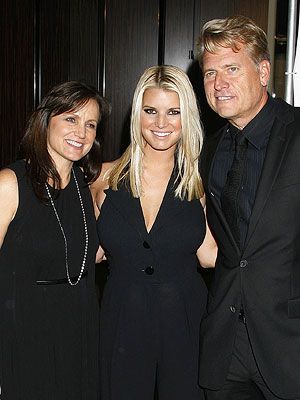 When Joe Simpson's name appears in the media, it's usually preceded by phrases like "out-of-control stage parent" and "pimp daddy." Harsh? Maybe. But after he delivered his two daughters, Jessica and Ashlee, into the sleazy arms of reality television and hawked racy photos of them to the tabloids, maybe not.
When Joe Simpson's name appears in the media, it's usually preceded by phrases like "out-of-control stage parent" and "pimp daddy." Harsh? Maybe. But after he delivered his two daughters, Jessica and Ashlee, into the sleazy arms of reality television and hawked racy photos of them to the tabloids, maybe not.
Joe Simpson operates under the philosophy that "a song doesn't sell a record; people sell records." He used Jessica's and Ashlee's MTV reality shows to peddle CDs, movies, and cosmetics. Jessica alone grossed more than $35 million in 2004. Although daddy is coy about percentages, there's no doubt he gets a sizable cut. How else could a former youth minister afford a Porsche, a mansion in Encino, and Steven Seagal's wardrobe?
During 2012 we saw quite a few events that still leave us slack jawed. Some lawyers and managers, that we have dealt with, have left us with the perfect stereotype of their job position. If you have to deal with issues that are regarding your financials or contracts, do yourself a big favor and read up on the information and don't let others take your money just to help "guide" you to the right decisions. Be responsible for your own future and take control of your situation.
Link to original post on Neatorama
 They've got bad hair and big cigars, and they want their 10 percent. Meet the world's most notorious music managers.
They've got bad hair and big cigars, and they want their 10 percent. Meet the world's most notorious music managers. 1. The Kingmaker: Colonel Tom Parker
Strange but true: Elvis Presley never performed overseas. The reason? Manager Tom Parker said so. Although Parker blamed security issues and the hassles of touring internationally, in truth, the Colonel was an illegal alien. If he left the country, he risked being exposed and barred re-entry.Born Andreas Cornelis van Kuijk in the Netherlands, Parker immigrated to the United States in the early 1930s and worked as a traveling carny. In the circus, he learned the two secrets of getting people into the tent: Always have a gimmick, and always appeal to the lowest common denominator. (Think of Presley's salacious hip thrusts and his legacy of cinematic fluff.)
Parker first managed country music stars such as Hank Snow and Eddy Arnold, but then found his big-top sensation—Elvis. Not willing to settle for the standard 10 percent fee, Parker cut himself in for 25 percent (and eventually 50 percent). Along the way, he invented the hallmarks of celebrity management—money up front, total media control, and massive merchandising. He was so cutthroat that when Elvis overdosed in 1977, the Colonel practically went straight from the funeral in Memphis to New York to negotiate deals for Elvis memorabilia.
During Elvis' final years as a Vegas perennial, Parker became addicted to gambling. When the Colonel died in 1997, he had less than $1 million of the estimated $100 million he made during his lifetime. He'd gambled the rest away.
2. The Bear: Albert Grossman
 Albert Grossman was known as The Bear. And depending on when you met him, he could be a Teddy or a grizzly. In the late 1950s, he was more of a Teddy. A music lover with a booming voice and a master's degree in economics, Grossman opened a club in Chicago, where he nurtured the careers of folk singers such as Odetta, Gordon Lightfoot, and Bob Dylan.
Albert Grossman was known as The Bear. And depending on when you met him, he could be a Teddy or a grizzly. In the late 1950s, he was more of a Teddy. A music lover with a booming voice and a master's degree in economics, Grossman opened a club in Chicago, where he nurtured the careers of folk singers such as Odetta, Gordon Lightfoot, and Bob Dylan.But when Grossman moved into personal management in the 1960s, the grizzly emerged. He used his bulky 6-foot frame and unnerving stare to intimidate record labels into parting with vast fortunes. Elektra Records honcho Bob Krasnow told Musician magazine, "What you see today in the music business is the result of Albert. He changed the whole idea of what a negotiation was all about."
With a taste for fine living, the grizzly got greedy. Bob Dylan disapproved, and their relationship grew bitter. With Grossman in mind, Dylan wrote the lyrics, "I pity the poor immigrant who falls in love with wealth and turns his back on me." He terminated Grossman's services a few months later in 1971.
But that was hardly the end of their relationship. The Bear trailed Dylan for more a decade, filing a multimillion dollar lawsuit for back royalties. At the time of his death in 1987, Grossman was still pursuing the money. In Martin Scorsese's No Direction Home, Dylan said, "He was kind of like a Colonel Parker figure. You could smell him coming."
3. The Wannabe Rock Star: Tony Defries
Tony Defries' hero was Elvis' manager, Colonel Tom Parker. So in 1970, when Defries saw a new king of rock in 23-year-old David Bowie, he pounced on the opportunity. The fearless Defries got Bowie signed to Elvis' label, RCA, then spent lavishly on publicity stunts. He famously flew a plane full of American journalists first-class to London, where they watched Bowie perform his fantasy album Ziggy Stardust at the Dorchester Hotel. The press was then granted a private audience with Bowie in his suite, where he was still decked out in full glam-rock regalia. For his troubles, Defries took half the earnings.Unlike the Colonel, who was a family man, Defries lived extravagantly. With his eight Manhattan apartments, karate-suit-wearing bodyguards, and crushed-velvet suits, Defries was more of a rock star than Bowie. In fact, at the height of his Ziggy fame, Bowie often borrowed money from Defries just to buy groceries. "I slaved and made nothing," Bowie said after dumping Defries in 1975. The divorce wasn't easy. In addition to 50 percent of all back royalties, Bowie surrendered 16 percent of future gross earnings through 1982.
4. The Micromanager: Robert Stigwood

As a junior partner in Brian Epstein's music empire, Robert Stigwood was almost given the opportunity to manage The Beatles. Unfortunately for him, the group rebelled. As Paul McCartney told him, "If you somehow manage to pull this off, we can promise you one thing. We will record "˜God Save the Queen' for every single record we make from now on, and we'll sing it out of tune."
But perhaps The Beatles weren't aware of just how hard he worked. For Stigwood, management meant working for your artists 24 hours a day, seven days a week. He traveled with his two most famous bands—a power-rock trio called Cream and a pop-disco trio called the Bee Gees—playing the role of father, confessor, and babysitter all at once. He'd hang out in the studio while they recorded and help them pick out five-button suits after work. In fact, Stigwood may have been a little too hands-on. In 1980, after 13 years under his care, the Bee Gees sued, claiming that Stigwood had withheld $75 million in royalties. Stigwood countersued, and they settled out of court, trading barbs in the press.
5. The Al Capone of Pop: Don Arden
 Don Arden once had his henchmen dangle fellow manager Robert Stigwood out a fourth-floor window. Why? Arden suspected Stigwood of trying to steal one of his bands. Known as the "Al Capone of Pop," Arden swaggered through 1960s London, skimming cream off the top of every royalty check he could get his hands on. Even when one of his most successful bands, The Small Faces, was bringing in loads of cash, he only offered them an allowance of £20 a week.
Don Arden once had his henchmen dangle fellow manager Robert Stigwood out a fourth-floor window. Why? Arden suspected Stigwood of trying to steal one of his bands. Known as the "Al Capone of Pop," Arden swaggered through 1960s London, skimming cream off the top of every royalty check he could get his hands on. Even when one of his most successful bands, The Small Faces, was bringing in loads of cash, he only offered them an allowance of £20 a week.In the early 1970s, Arden launched Jet Records for the English heavy metal band Black Sabbath. Then, in 1979, lead singer Ozzy Osbourne was fired from the group. Arden didn't seem too bothered. That is, until he discovered that his daughter, Sharon, who'd been working for him, had picked up Ozzy as a client. Angry that she'd stolen business from him, Arden reportedly sicced his vicious Dobermans on her. Sharon was pregnant at the time and lost the child. However, she held on to Ozzy's business and later married the rock star.
In 1987, Don Arden faced trial for blackmailing business associates, but was acquitted. As for Sharon, she and her father reconciled after he was diagnosed with Alzheimer's in 2001. He passed away in 2007.
6. The Evil Dentist: Allen Klein
 The Beatles' manager Brian Epstein might have built a financial empire, but it collapsed two years after he died in 1967. And that's when money-vulture Allen Klein swooped in to pick it clean.
The Beatles' manager Brian Epstein might have built a financial empire, but it collapsed two years after he died in 1967. And that's when money-vulture Allen Klein swooped in to pick it clean.The brash, barrel-shaped former accountant cut his teeth in the music business in the early 1960s. Once dubbed the "Robin Hood of Pop," Klein made an early name for himself by reaping millions in misappropriated royalties for clients such as crooner Bobby Darin and soul legend Sam Cooke. By the time he met The Beatles, he was negotiating megadeals for The Rolling Stones. John Lennon admired his street smarts, and George and Ringo followed suit. But Paul never fell prey to his charms. In fact, he often had nightmares about Klein in which the manager surfaced as an evil dentist.
Indeed, Klein didn't hesitate to pull teeth. The moment he took control of The Beatles, he gutted the band's production company, firing whomever he deemed superfluous. He then negotiated lucrative publishing and recording deals for the band and nabbed excessive commissions. In 1973, lawsuits from John, Paul, George, and Ringo began piling in.
Throughout the years, Klein soured several relationships. He was dropped by The Rolling Stones for unethical behavior in the 1960s and investigated by the IRS in the 1970s for embezzling money from George Harrison's benefit show The Concert for Bangladesh. In 1997, Klein was still up to his old tricks, suing British indie rock group The Verve over their hit "Bittersweet Symphony." The band had sampled orchestration from "The Last Time," a recording by The Rolling Stones that Klein controlled. After winning the lawsuit, Klein licensed The Verve's masterpiece to Nike for millions. Klein lives in Los Angeles, where he has one remaining client—wall-of-sound producer Phil Spector. [ed. note: Klein died in 2009]
7. The Royal Pain: Malcolm McLaren
 "The music wasn't important," Malcolm McLaren once said. "It was a declaration of intent and an attitude." In 1975, when McLaren took on a pub band named The Swankers (soon renamed the Sex Pistols), the intent was chaos, and the attitude was infamously punk. Eschewing the pomp of 1970s rock, The Sex Pistols played fast, hard music that condemned authority—the perfect style for manager McLaren, who lived to be a lightning rod.
"The music wasn't important," Malcolm McLaren once said. "It was a declaration of intent and an attitude." In 1975, when McLaren took on a pub band named The Swankers (soon renamed the Sex Pistols), the intent was chaos, and the attitude was infamously punk. Eschewing the pomp of 1970s rock, The Sex Pistols played fast, hard music that condemned authority—the perfect style for manager McLaren, who lived to be a lightning rod.In May 1977, the Sex Pistols released the incendiary song "God Save The Queen." Swiping its name from the British national anthem, the spitfire single equated the royal family with a "fascist regime" and derided the Queen as "no human being." With Britain in tumult, McLaren booked the Pistols on a boat trip down the Thames, where they performed outside the Houses of Parliament. The police raided the party, only adding to the glory of the chaos. The happening was McLaren's masterpiece.
8. The Muscle: Peter Grant

A bearded behemoth, Peter Grant was 300 lbs. of pure intimidation. He once beat up a music promoter who tried to stiff one of his singers after a show. Six policemen attempted to restrain him, but he pummeled them to the ground, too.
Born in London in 1935, Grant had a Dickensian childhood, replete with the trials of war, poverty, and heartbreak. But it all made him stronger. By the time he was a teenager, he was so big that he wrestled professionally (performing under the name Prince Mario Alassio). Grant soon parlayed this strength into management muscle, strong-arming for rock "˜n' roll legends Chuck Berry and Little Richard. But he didn't discover his destiny until he became the manager and unofficial fifth member of Led Zeppelin.
Although he was feared and loathed in many circles, Grant had one truly admirable trait—he believed the artist mattered most. In 1968, he finessed Atlantic Records into coughing up an unprecedented $200,000 advance for Zeppelin's five-year recording contract, plus the highest royalty rate ever negotiated for a band (five times that of The Beatles). He rode the Zeppelin high through the 1970s. But when the band's drummer, John Bonham, died in 1980, Grant was traumatized. He retreated behind the moat surrounding his mansion and binged on cocaine and junk food for the rest of the decade.
9. The Man Behind the Boy Bands: Lou Pearlman
 When Lou Pearlman was arrested in 2007 for embezzling more than $300 million from investors, decades of scamming and swindling came to an end. And apparently, he did it all with a televangelist's flair. Pearlman's former publicist, Jay Marose, once said of him, "You could "¦ hold a Bible in one hand and tell him your name, and he could tell you you were wrong and make you believe it."
When Lou Pearlman was arrested in 2007 for embezzling more than $300 million from investors, decades of scamming and swindling came to an end. And apparently, he did it all with a televangelist's flair. Pearlman's former publicist, Jay Marose, once said of him, "You could "¦ hold a Bible in one hand and tell him your name, and he could tell you you were wrong and make you believe it."For years, the rotund New Yorker lined his pockets with the proceeds of dodgy business ventures. He was the advertising genius behind the Jordache Jeans' blimp and its inaugural flight, which lasted one minute before crashing into a garbage dump. He also built a fake aviation company by showing photos of model planes to investors. But he found his calling when he started managing a group of Chippendales dancers in the 1980s. After working with the topless beefcakes for several years, he happened to meet the New Kids on the Block in 1992, and the combination led Pearlman to an epiphany.
Using newspaper ads and casting calls for teenage boys who could sing and dance, Pearlman formed the Backstreet Boys and *NSync. Within three years, the prefab quintets ruled popular music. "Big Poppa" Pearlman reveled in the glory, paying for his boys' clothing, housing, and tours. But he didn't pay the bands. As Justin Timberlake later said, "We were being monetarily raped by a Svengali." Amid lawsuits and allegations of sexual misconduct, Pearlman stayed afloat with pump-n-dump stock schemes. When the jig was up, he fled the country. In May 2008, however, Pearlman appeared in court, and he was sentenced to 25 years in prison.
10. The Pimp Daddy: Joe Simpson
 When Joe Simpson's name appears in the media, it's usually preceded by phrases like "out-of-control stage parent" and "pimp daddy." Harsh? Maybe. But after he delivered his two daughters, Jessica and Ashlee, into the sleazy arms of reality television and hawked racy photos of them to the tabloids, maybe not.
When Joe Simpson's name appears in the media, it's usually preceded by phrases like "out-of-control stage parent" and "pimp daddy." Harsh? Maybe. But after he delivered his two daughters, Jessica and Ashlee, into the sleazy arms of reality television and hawked racy photos of them to the tabloids, maybe not.Joe Simpson operates under the philosophy that "a song doesn't sell a record; people sell records." He used Jessica's and Ashlee's MTV reality shows to peddle CDs, movies, and cosmetics. Jessica alone grossed more than $35 million in 2004. Although daddy is coy about percentages, there's no doubt he gets a sizable cut. How else could a former youth minister afford a Porsche, a mansion in Encino, and Steven Seagal's wardrobe?
Weathering debacles like Ashlee's Saturday Night Live lip-synch scandal and Jessica's cinematic flops (Blonde Ambition, Employee Of The Month), Joe plunders on. Despite the ambitious blitz, Joe contends, "My first responsibility is to be a father before I'm a manager. It's complicated, but it's worked so far." [ed note: Joe and Dina Simpson are now in the process of divorce.

